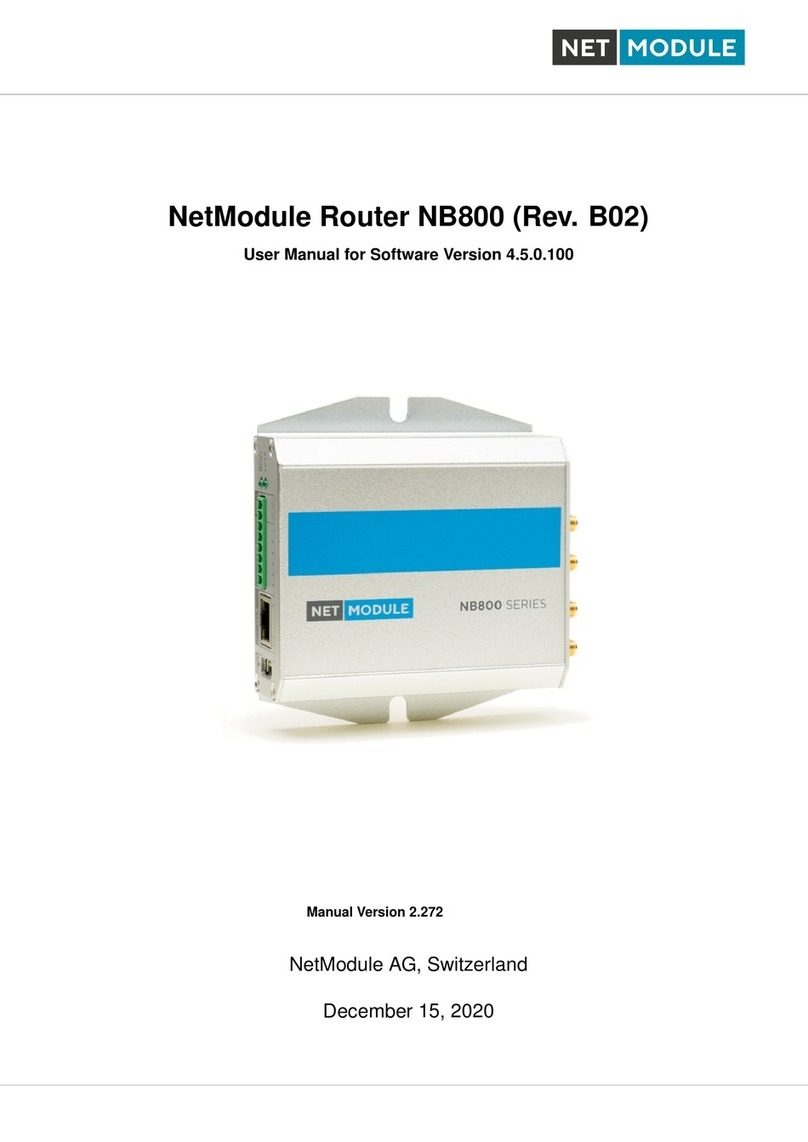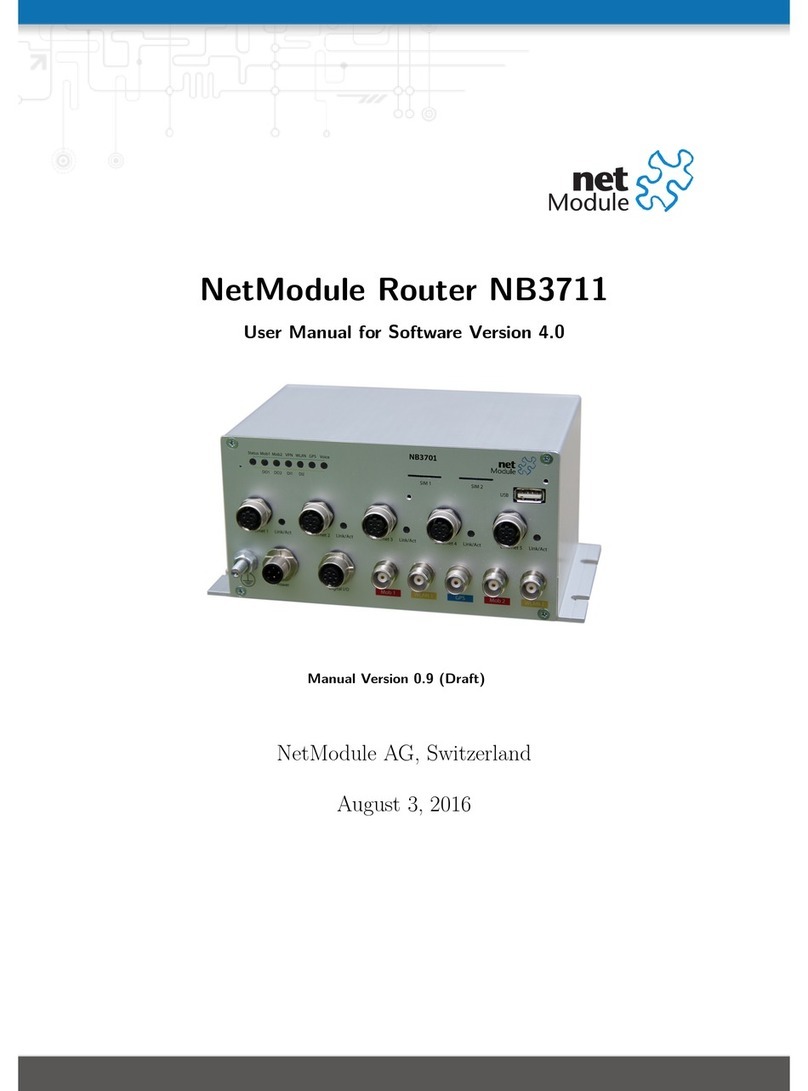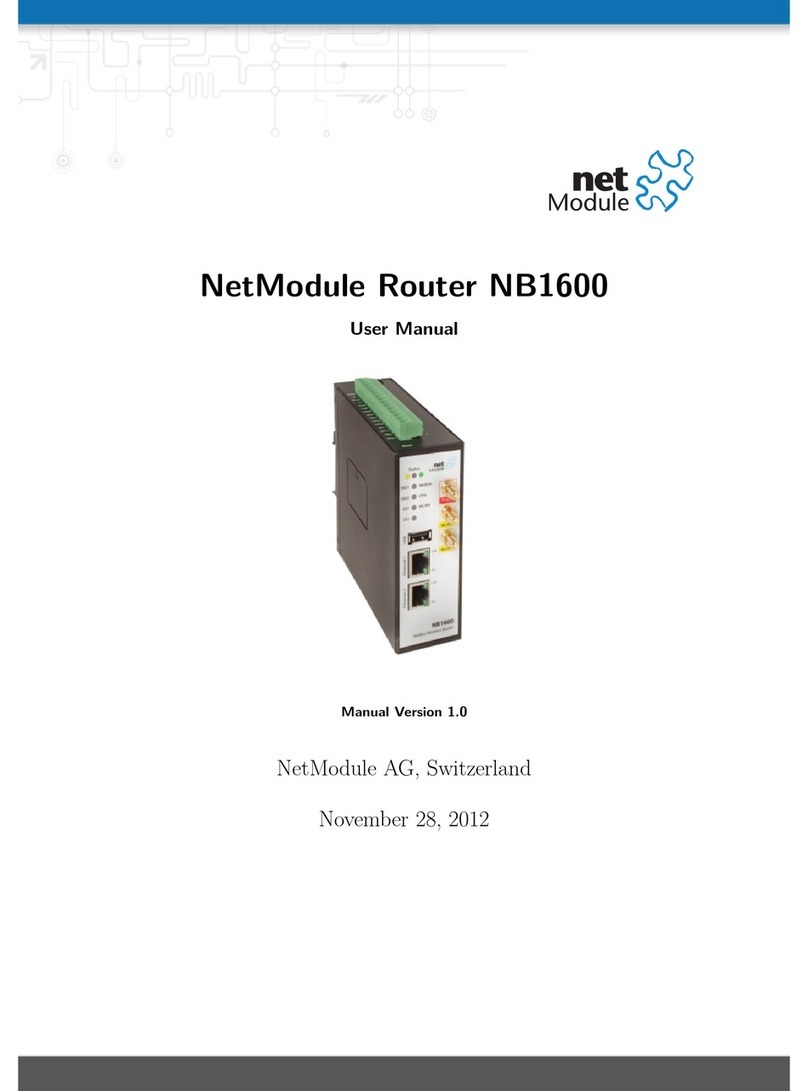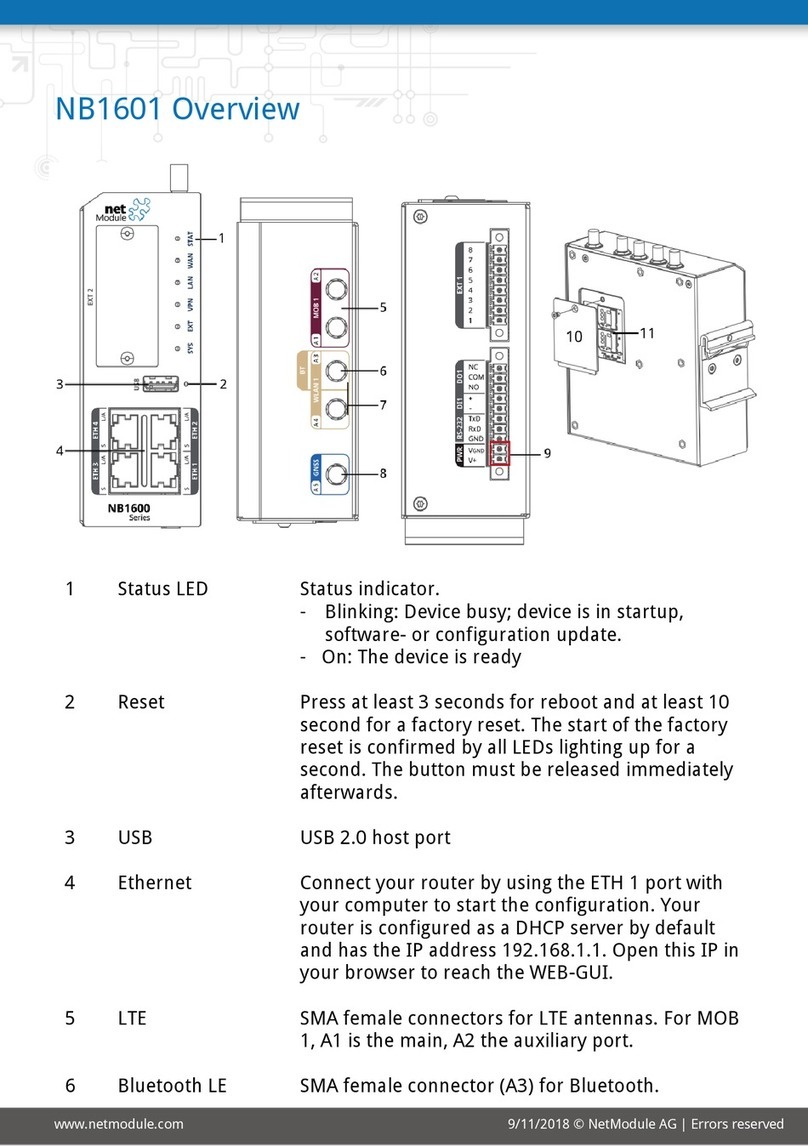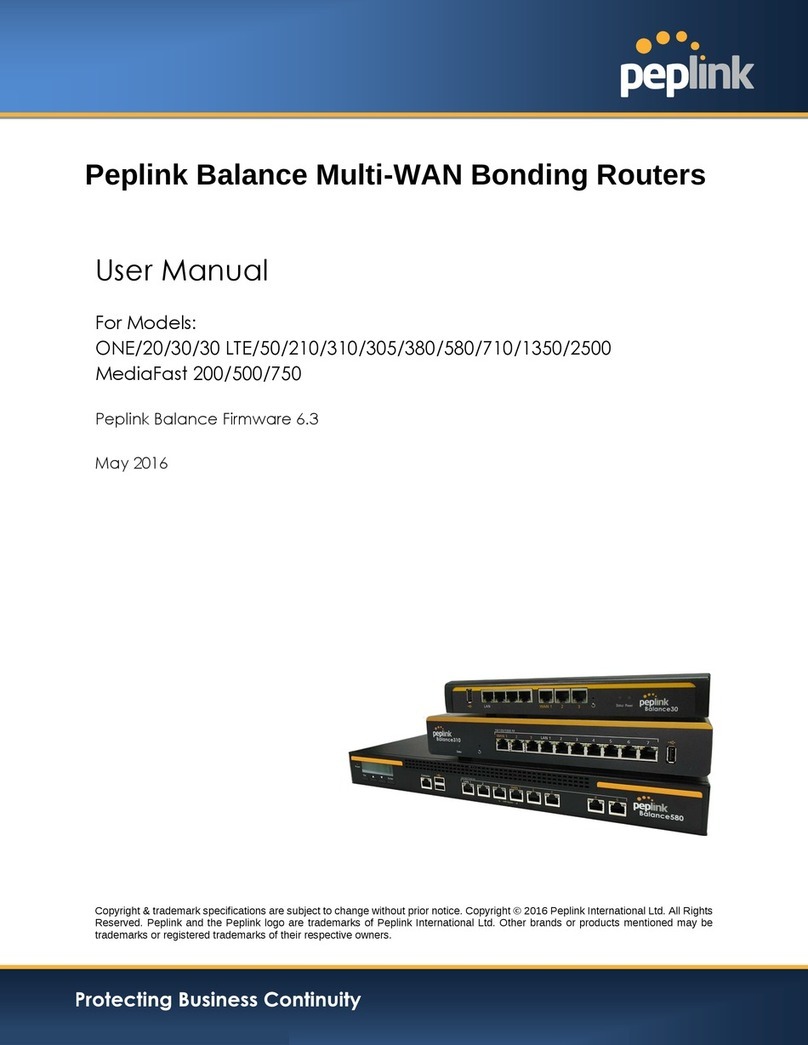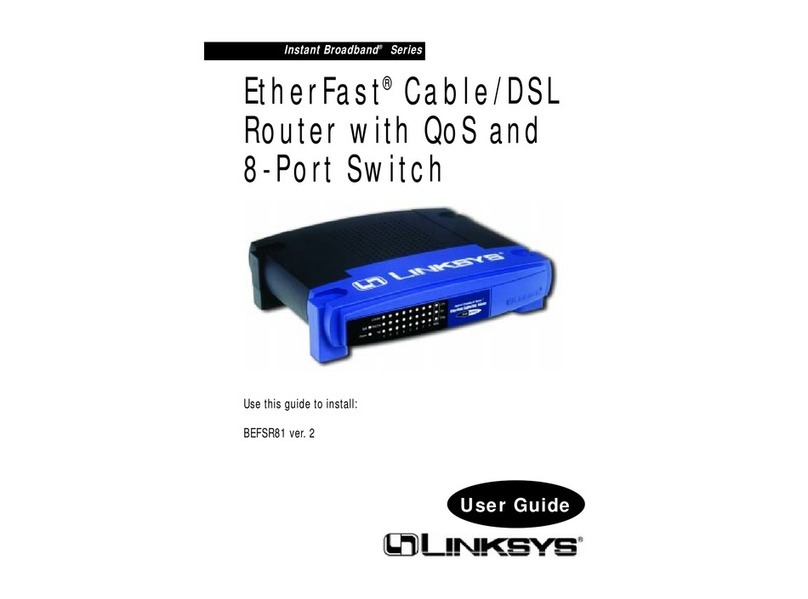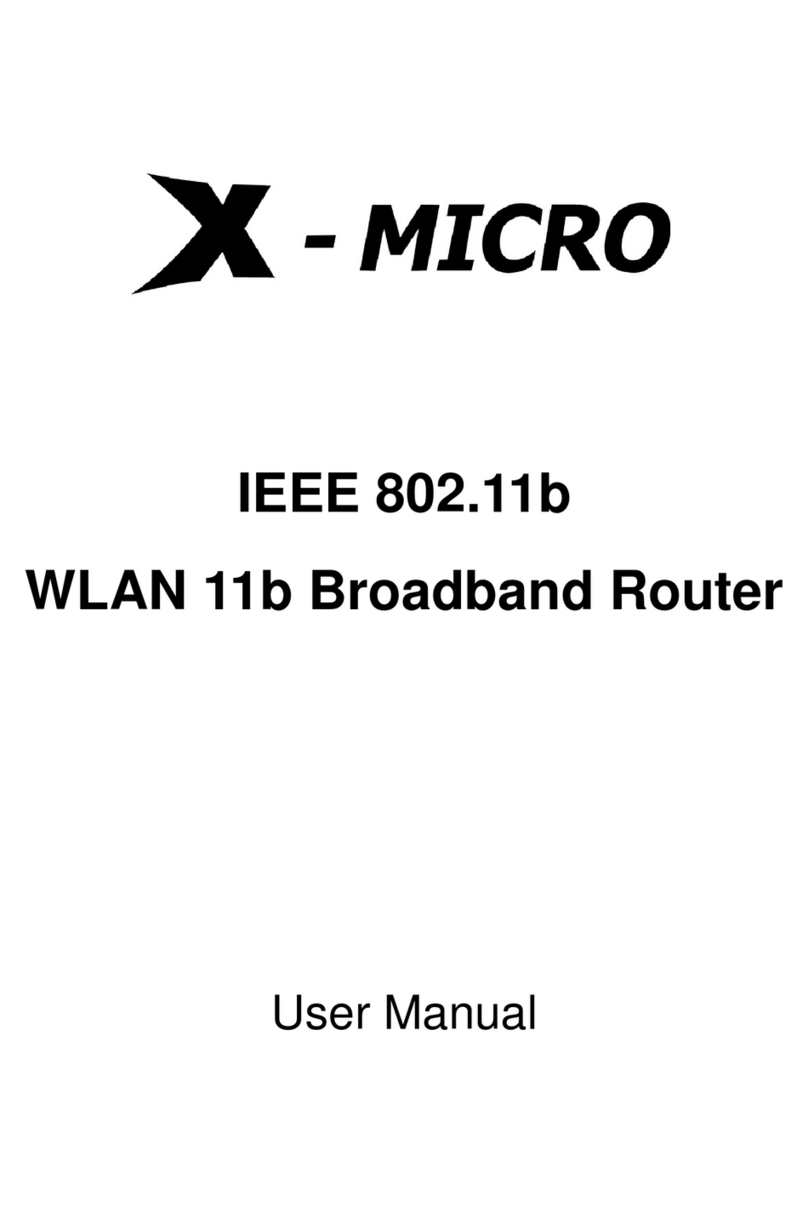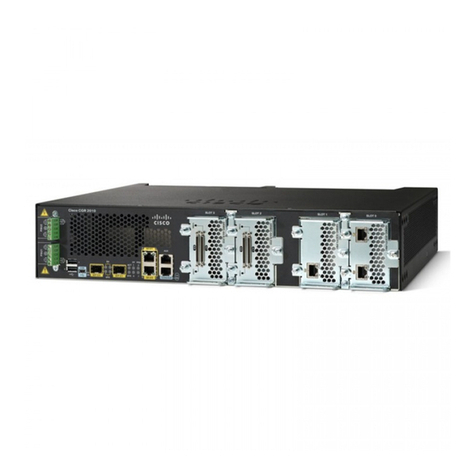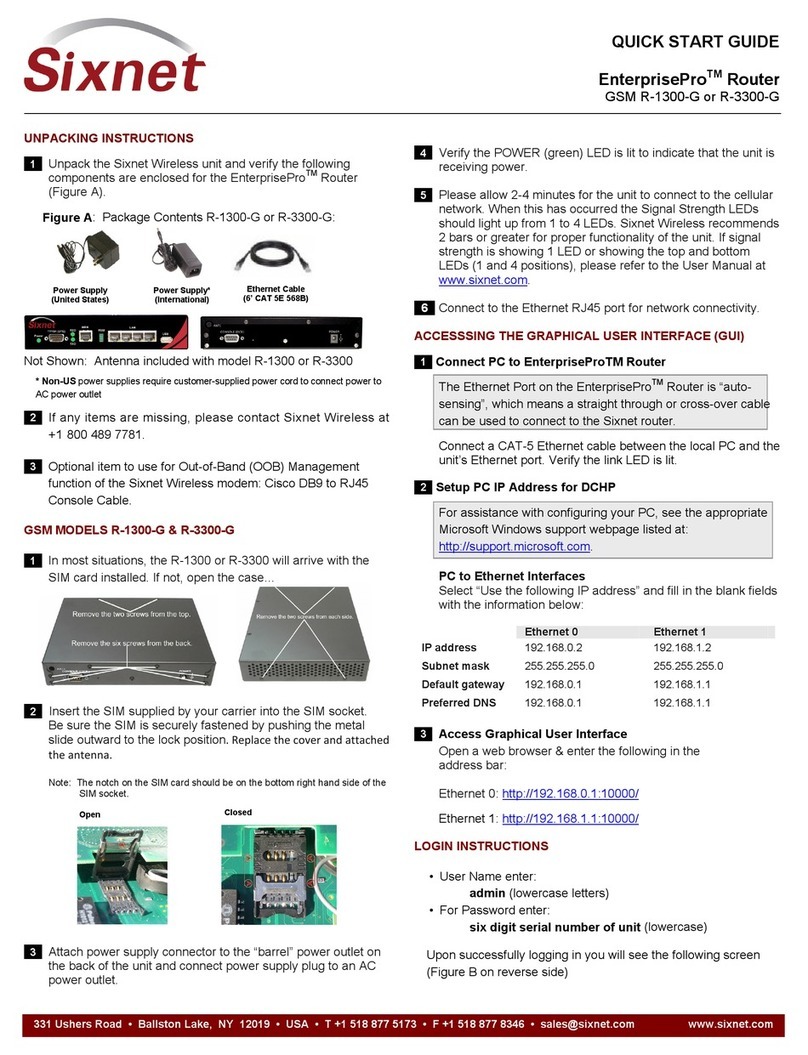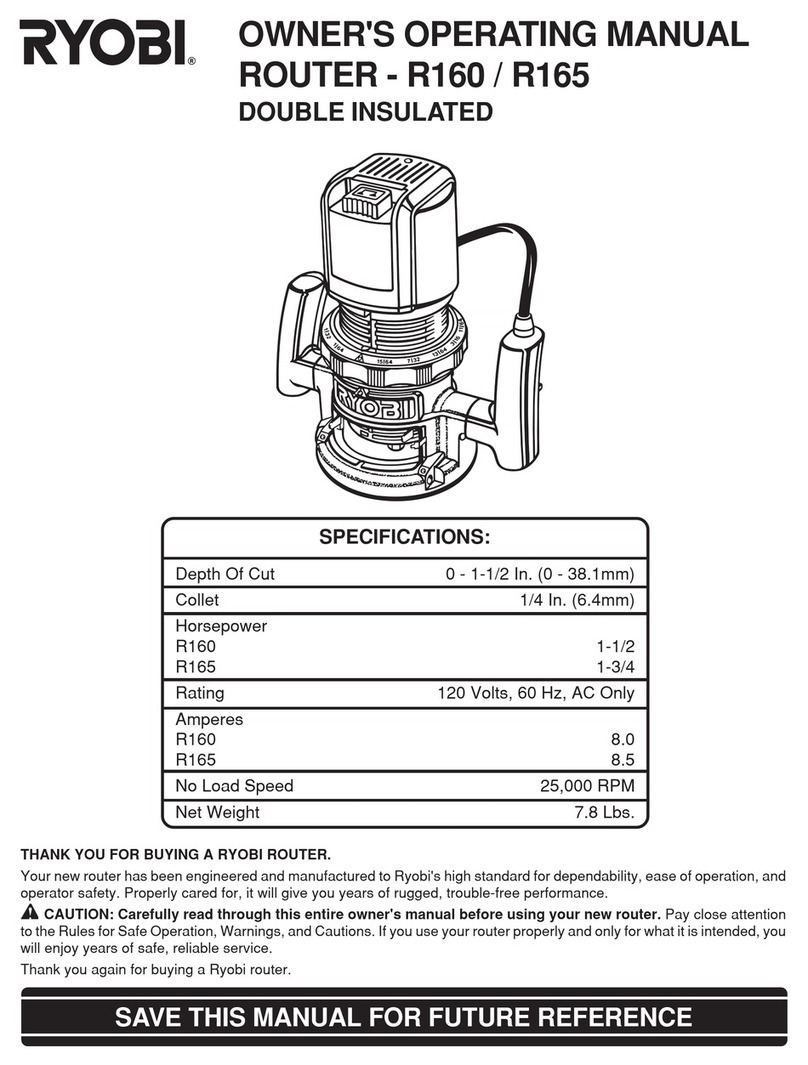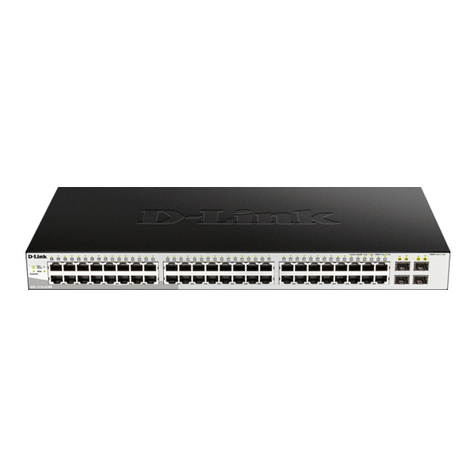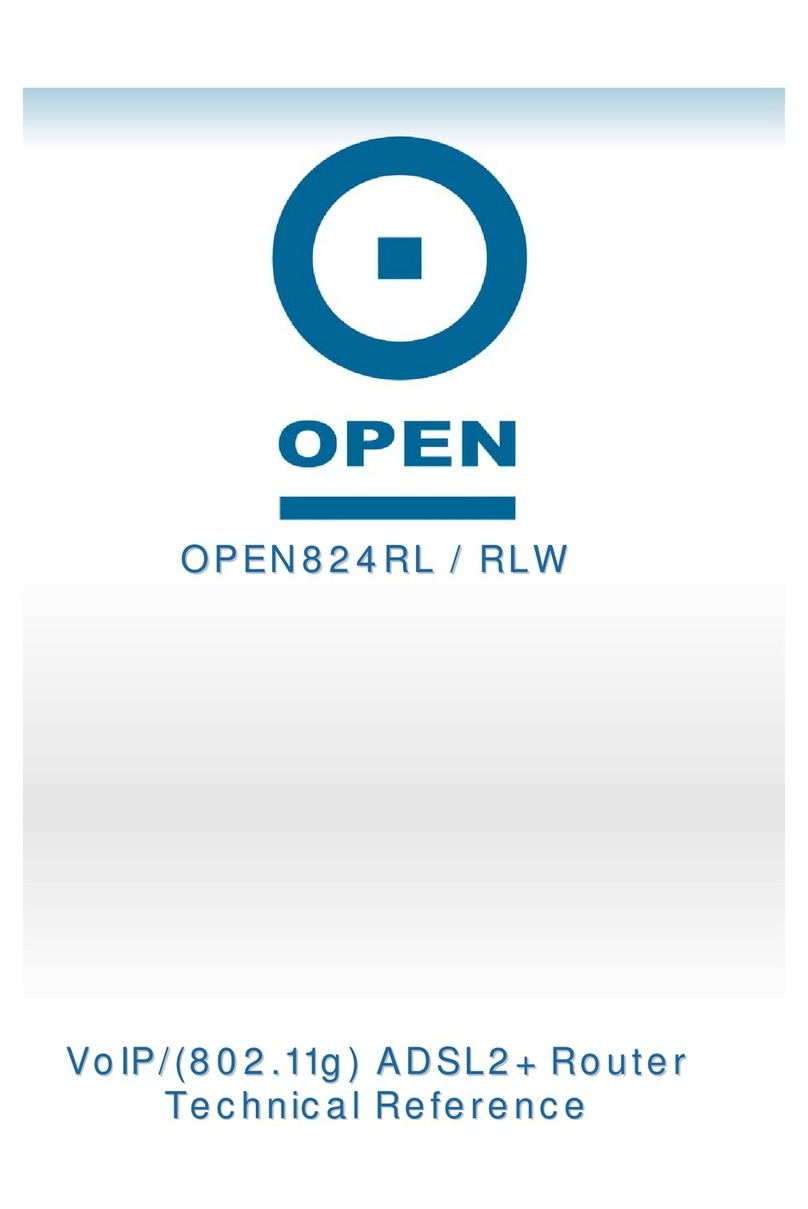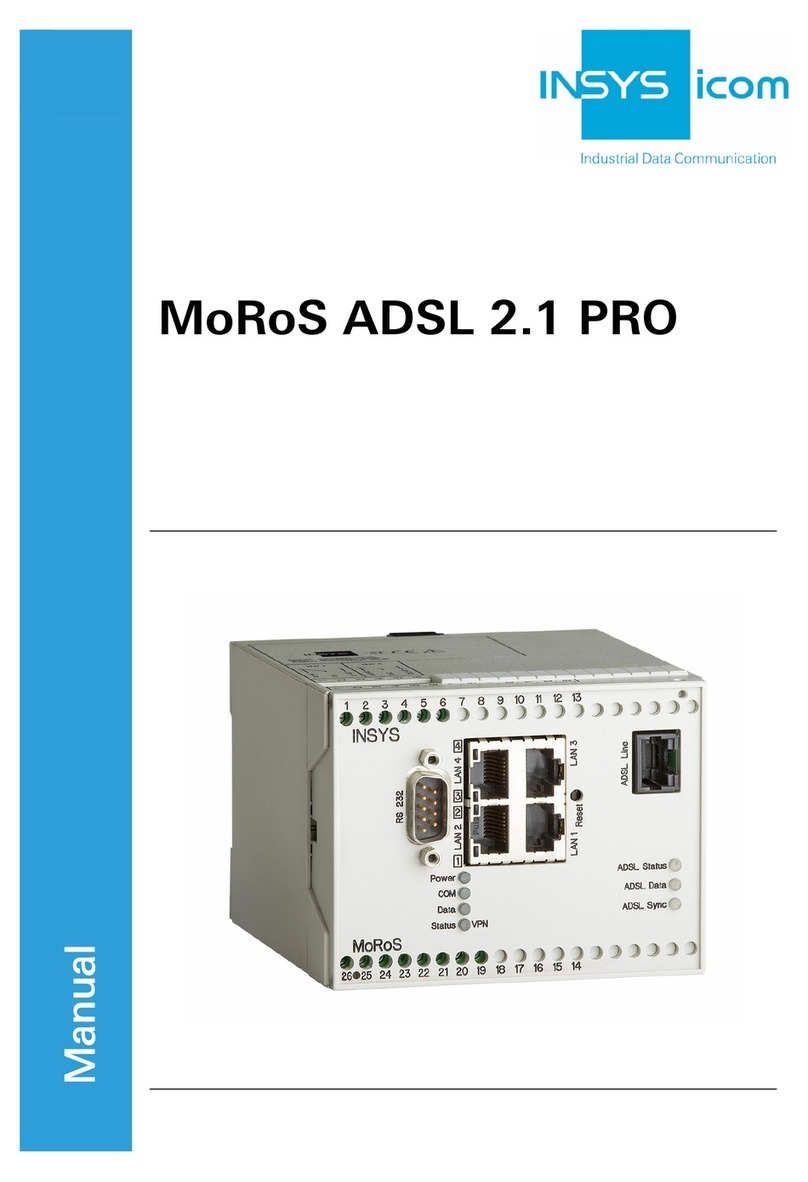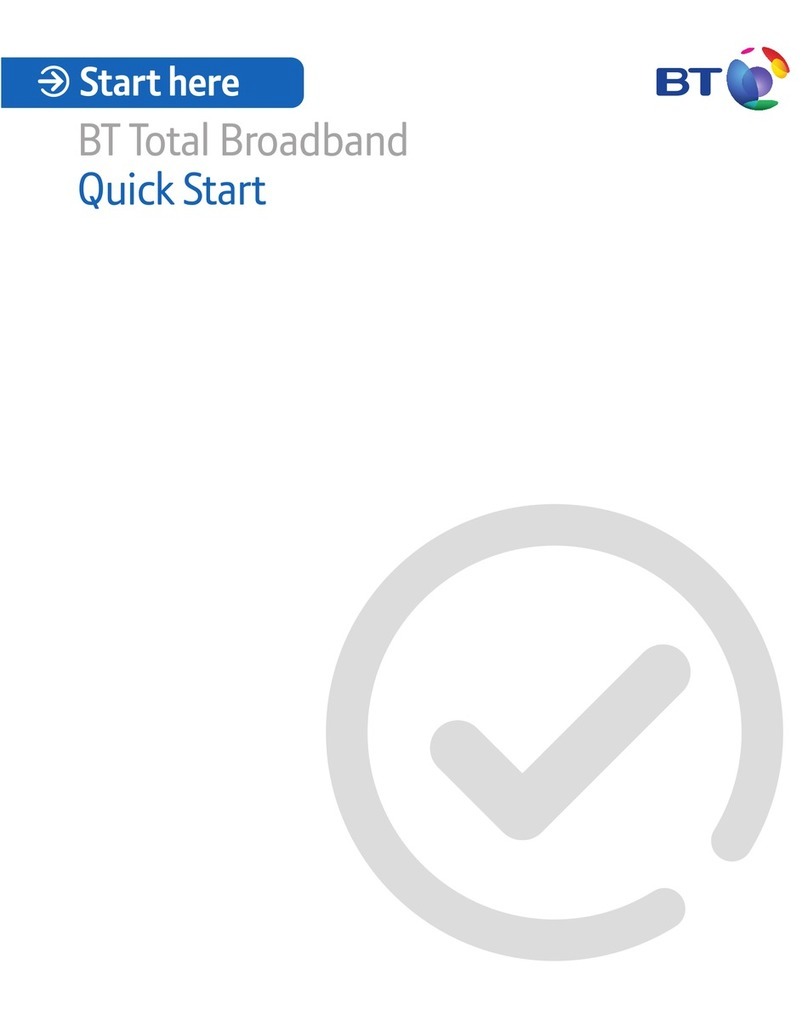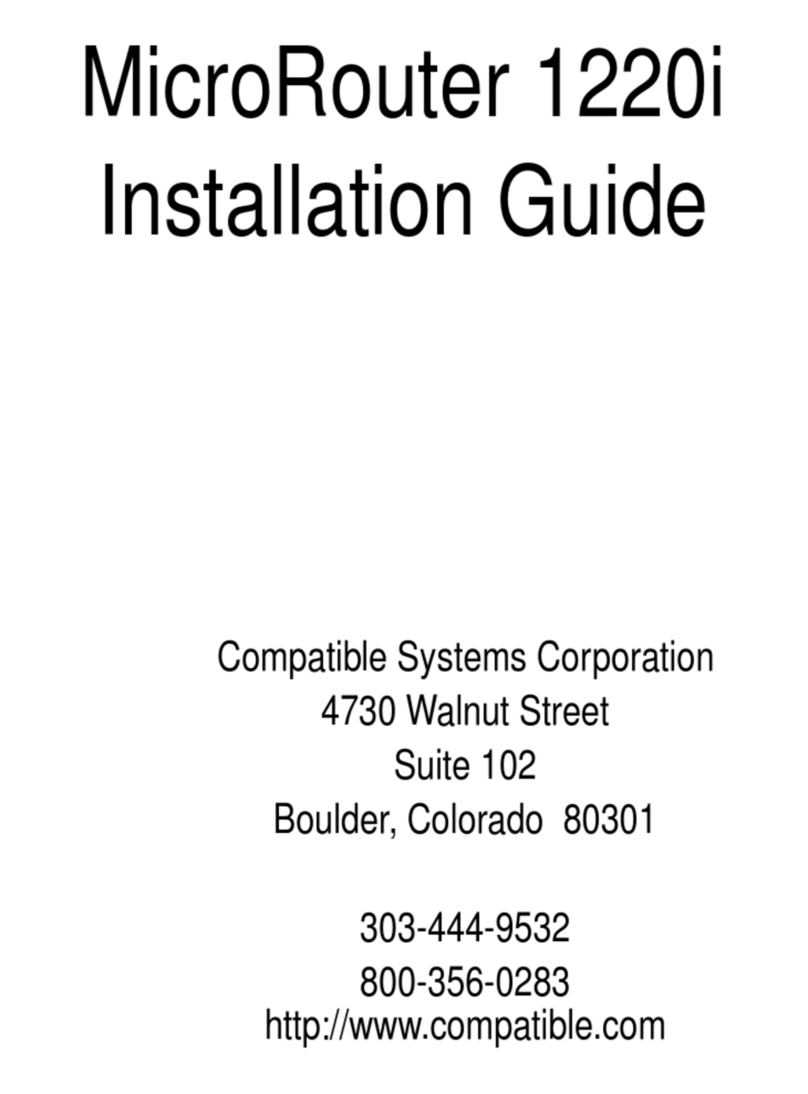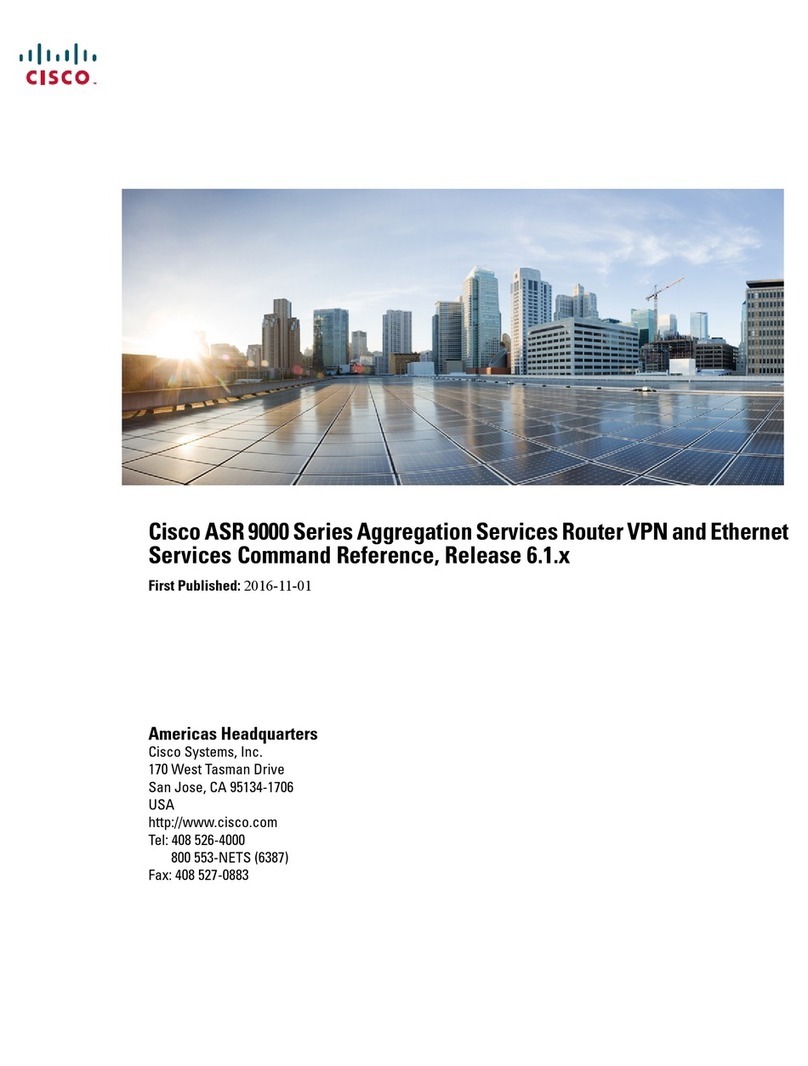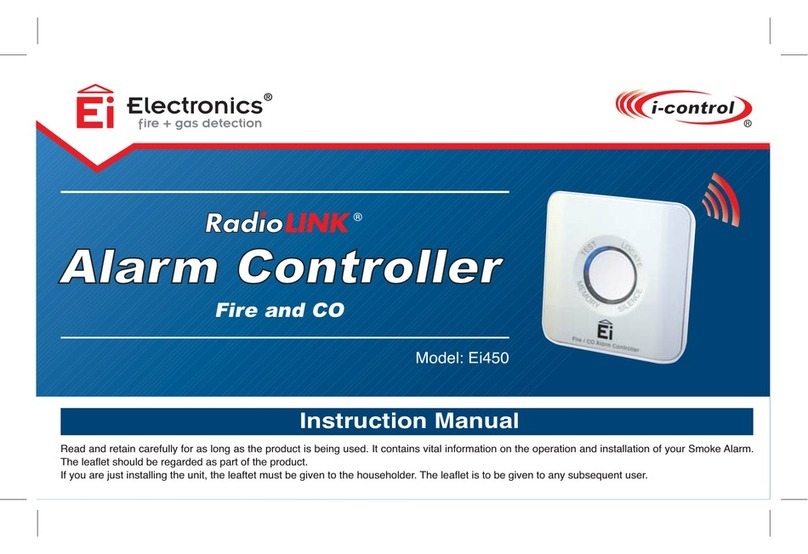NetModule NB3000-Line-Hd User manual

NetModule Router NB3000-Line-Hd
User Manual for Software Version 4.2
Manual Version 1.12
NetModule AG, Switzerland
November 28, 2018

NetModule Router NB3000-Line-Hd
This manual covers all variants of the NB3000-Line-Hd product type.
The specifications and information regarding the products in this manual are subject to change without notice.
We would like to point out that NetModule makes no representation or warranties with respect to the contents
herein and shall not be responsible for any loss or damage caused to the user by the direct or indirect use of
this information This document may contain information about third party products or processes. Such third
party information is generally out of influence of NetModule and therefore NetModule shall not be responsible
for the correctness or legitimacy of this information. Users must take full responsibility for their application of
any products.
Copyright ©2018 NetModule AG, Switzerland All rights reserved
This document contains proprietary information of NetModule. No parts of the work described herein may be
reproduced. Reverse engineering of the hardware or software is prohibited and protected by patent law. This
material or any portion of it may not be copied in any form or by any means, stored in a retrieval system, adopted
or transmitted in any form or by any means (electronic, mechanical, photographic, graphic, optic or otherwise),
or translated in any language or computer language without the prior written permission of NetModule.
A large amount of the source code to this product is available under licenses which are both free and open
source. Most of it is covered by the GNU General Public License which can be obtained from www.gnu.org. The
remainder of the open source software which is not under the GPL, is usually available under one of a variety of
more permissive licenses. A detailed license information for a particular software package can be provided on
request.
All other products or company names mentioned herein are used for identification purposes only and may be
trademarks or registered trademarks of their respective owners. The following description of software, hard-
ware or process of NetModule or other third party provider may be included with your product and will be
subject to the software, hardware or other license agreements.
Contact
www.netmodule.com/support
NetModule AG Tel +41 31 985 25 10
Meriedweg 11 Fax +41 31 985 25 11
CH-3172 Niederwangen info netmodule.com
Switzerland http://www.netmodule.com

Contents
1. Welcome to NetModule ................................. 1
2. Conformity ........................................ 2
2.1. Safety Instructions .................................. 2
2.2. Declaration of Conformity .............................. 4
2.3. Waste Disposal .................................... 4
2.4. National Restrictions ................................. 4
2.5. Open Source Software ................................ 5
3. Specifications ....................................... 6
3.1. Appearance ...................................... 6
3.2. Features ........................................ 7
3.3. Environmental Conditions .............................. 8
3.4. Interfaces ....................................... 9
3.4.1. Overview ..................................... 9
3.4.2. LED Indicators .................................. 11
3.4.3. Reset ....................................... 12
3.4.4. Mobile ...................................... 13
3.4.5. WLAN ....................................... 14
3.4.6. GNSS ....................................... 15
3.4.7. USB 2.0 Host Port ................................ 16
3.4.8. M12 Ethernet Connectors ........................... 16
3.4.9. Power Supply .................................. 18
3.4.10.Extension Connector .............................. 20
3.5. Data Storage (Option Dx) .............................. 27
3.6. Option NB3711 .................................... 27
3.6.1. Power Supply NB3711 ............................. 28
4. Installation ........................................ 30
4.1. Installation of the SIM Cards ............................ 30
4.2. Installation of the GSM/UMTS/LTE Antenna .................... 30
4.3. Installation of the WLAN Antennas ......................... 31
4.4. Installation of the GNSS Antenna .......................... 32
4.5. Installation of the Local Area Network ....................... 33
4.6. Installation of the Power Supply .......................... 33
5. Configuration ....................................... 34
5.1. First Steps ....................................... 34
5.1.1. Initial Access ................................... 34
5.1.2. Recovery ..................................... 35
5.2. HOME ......................................... 37
5.3. INTERFACES ...................................... 40
5.3.1. WAN ....................................... 40
5.3.2. Ethernet ..................................... 47
5.3.3. Mobile ...................................... 52
5.3.4. WLAN ....................................... 57
5.3.5. Software Bridges ................................ 66
5.3.6. USB ........................................ 67
5.3.7. Serial Port .................................... 70
3

NB3000-Line-Hd User Manual 4.2
5.3.8. Digital I/O .................................... 74
5.3.9. Audio ....................................... 75
5.3.10.GNSS ....................................... 76
5.4. ROUTING ....................................... 79
5.4.1. Static Routes ................................... 79
5.4.2. Extended Routing ................................ 81
5.4.3. Multipath Routes ................................ 82
5.4.4. Mobile IP ..................................... 83
5.4.5. Quality Of Service ................................ 86
5.4.6. Multicast ..................................... 88
5.4.7. OSPF ....................................... 89
5.4.8. BGP ........................................ 90
5.5. FIREWALL ....................................... 91
5.5.1. Administration ................................. 91
5.5.2. Adress/Port Groups ............................... 91
5.5.3. Rules ....................................... 92
5.5.4. NAPT ....................................... 94
5.6. VPN .......................................... 97
5.6.1. OpenVPN .................................... 97
5.6.2. IPsec .......................................103
5.6.3. PPTP .......................................109
5.6.4. GRE ........................................112
5.6.5. Dial-In ......................................113
5.7. SERVICES .......................................115
5.7.1. SDK ........................................115
5.7.2. DHCP Server ...................................124
5.7.3. DNS Server ....................................126
5.7.4. NTP Server ....................................128
5.7.5. Dynamic DNS ..................................129
5.7.6. E-Mail .......................................131
5.7.7. Events ......................................132
5.7.8. SMS ........................................133
5.7.9. SSH/Telnet Server ................................135
5.7.10.SNMP Agent ...................................137
5.7.11.Web Server ...................................142
5.7.12.Discovery ....................................143
5.7.13.Redundancy ...................................144
5.7.14.Voice Gateway ..................................146
5.8. SYSTEM ........................................152
5.8.1. System ......................................152
5.8.2. Authentication ..................................158
5.8.3. Software Update ................................161
5.8.4. Module Firmware Update ...........................162
5.8.5. Software Profiles ................................163
5.8.6. Configuration ..................................164
5.8.7. Troubleshooting .................................167
5.8.8. Keys and Certificates ..............................170
4

NB3000-Line-Hd User Manual 4.2
5.8.9. Licensing .....................................175
5.8.10.Legal Notice ...................................176
5.9. LOGOUT ........................................177
6. Command Line Interface ................................178
6.1. General Usage ....................................178
6.2. Print Help .......................................179
6.3. Getting Config Parameters .............................180
6.4. Setting Config Parameters ..............................180
6.5. Checking Config Completed .............................180
6.6. Getting Status Information .............................180
6.7. Scanning Networks ..................................181
6.8. Sending E-Mail or SMS ................................181
6.9. Updating System Facilities ..............................182
6.10. Manage keys and certificates ............................182
6.11. Restarting Services ..................................183
6.12. Debug System .....................................183
6.13. Resetting System ...................................184
6.14. Rebooting System ..................................184
6.15. Running Shell Commands ..............................184
6.16. Working with History .................................185
6.17. CLI-PHP ........................................185
A. Appendix .........................................190
A.1. Abbrevations .....................................190
A.2. System Events ....................................192
A.3. Factory Configuration ................................194
A.4. SNMP VENDOR MIB .................................195
A.5. SDK Examples .....................................214
5

List of Figures
5.1. Initial Login ...................................... 35
5.2. Home ......................................... 37
5.3. WAN Links ...................................... 40
5.4. WAN Settings ..................................... 44
5.5. Link Supervision ................................... 45
5.6. Ethernet Ports .................................... 47
5.7. Ethernet Link Settings ................................ 48
5.8. VLAN Management .................................. 49
5.9. LAN IP Configuration ................................ 50
5.10. SIMs .......................................... 52
5.11. WWAN Interfaces .................................. 55
5.12. WLAN Management ................................. 57
5.13. WLAN Configuration ................................. 61
5.14. WLAN IP Configuration ............................... 65
5.15. USB Administration ................................. 67
5.16. USB Device Management .............................. 68
5.17. Serial Port Administration .............................. 70
5.18. Serial Port Settings .................................. 71
5.19. Digital I/O Ports ................................... 74
5.20. Static Routing ..................................... 79
5.21. Extended Routing .................................. 81
5.22. Multipath Routes ................................... 82
5.23. Mobile IP ....................................... 85
5.24. Firewall Groups .................................... 91
5.25. Firewall Rules ..................................... 92
5.26. Masquerading .................................... 94
5.27. Inbound NAPT .................................... 95
5.28. OpenVPN Administration .............................. 97
5.29. OpenVPN Configuration ............................... 98
5.30. OpenVPN Client Management ...........................102
5.31. IPsec Administration .................................104
5.32. IPsec Configuration .................................105
5.33. PPTP Administration .................................109
5.34. PPTP Tunnel Configuration .............................110
5.35. PPTP Client Management ..............................111
5.36. Dial-in Server Settings ................................113
5.37. SDK Administration .................................119
5.38. SDK Jobs ........................................120
5.39. DHCP Server .....................................124
5.40. DNS Server ......................................126
5.41. NTP Server ......................................128
5.42. Dynamic DNS Settings ................................129
5.43. E-Mail Settings ....................................131
5.44. SMS Configuration ..................................133
6

NB3000-Line-Hd User Manual 4.2
5.45. SSH and Telnet Server ................................135
5.46. SNMP Agent .....................................138
5.47. Web Server ......................................142
5.48. VRRP Configuration .................................144
5.49. Voice Gateway Administration ...........................146
5.50. System ........................................152
5.51. Regional settings ...................................155
5.52. User Accounts ....................................158
5.53. Remote Authentication ...............................159
5.54. Manual File Configuration ..............................164
5.55. Automatic File Configuration ............................165
5.56. Factory Configuration ................................166
5.57. Log Viewer ......................................168
5.58. Tech Support File ...................................169
5.59. Keys and certificates .................................170
5.60. Certificate Configuration ..............................172
5.61. Licensing .......................................175
7

List of Tables
3.1. Environmental Conditions .............................. 8
3.2. NB3000-Line-Hd Interfaces ............................. 10
3.3. NB3000-Line-Hd Status Indicators ......................... 12
3.4. Ethernet Status Indicators ............................. 12
3.5. Mobile Interface ................................... 13
3.6. Mobile Antenna Port Specification ......................... 13
3.7. IEEE 802.11 Standards ................................ 14
3.8. WLAN Antenna Port Specification ......................... 14
3.9. GNSS Specifications option G ............................ 15
3.10. GNSS Specifications option Ge ........................... 15
3.11. GNSS / GPS Antenna Port Specification ...................... 15
3.12. USB 2.0 Host Port Specification ........................... 16
3.13. Ethernet Port Specification ............................. 16
3.14. Pin Assignments of 4 Poles Ethernet Connectors ................. 17
3.15. Pin Assignments of 8 Poles Ethernet Connectors ................. 17
3.16. Power Input Specifications Variant Pa ....................... 18
3.17. Power Input Specifications Variant Pb ....................... 19
3.18. Pin Assignments of Power Connector ....................... 19
3.19. Pin Assignments of Digital Inputs and Outputs .................. 20
3.20. Audio Port Specification ............................... 21
3.21. Pin Assignments of Audio Port Signals (EP1 / EP2) ................ 21
3.22. CAN Port Specification ................................ 22
3.23. Pin Assignments of CAN Port Signals (EP1 / EP2) ................. 22
3.24. IBIS Port Specification ................................ 23
3.25. Pin Assignments of IBIS Port Signals (EP1 / EP2) ................. 23
3.26. Non-isolated RS-232 Port Specification ...................... 24
3.27. Pin Assignments of RS-232 Port Signals (EP1 / EP2) ............... 24
3.28. Isolated RS-232 Port Specification ......................... 25
3.29. Pin Assignments of RS-232 Port Signals (EP1 / EP2) ............... 25
3.30. RS-485 Port Specification .............................. 26
3.31. Pin Assignments of RS-485 Port Signals (EP1 / EP2) ............... 26
3.32. Storage Specifications ................................ 27
3.33. Power Input Specifications NB3711 Variant Pa .................. 28
3.34. Power Input Specifications NB3711 Variant Pb .................. 29
3.35. Pin Assignments of Power Connector ....................... 29
4.1. LTE/UMTS antenna port types ........................... 31
4.2. WLAN antenna port types .............................. 32
5.19. IEEE 802.11 Network Standards .......................... 58
5.44. Static Route Flags .................................. 80
5.90. SMS Control Commands ..............................123
5.100. SMS Number Expressions ..............................134
5.142. Certificate Sections ..................................171
8

1. Welcome to NetModule
Thank you for purchasing a NetModule Router. This document should give you an introduc-
tion to the router and its features. The following chapters describe any aspects of commis-
sioning the device, installation procedure and provide helpful information towards configu-
ration and maintenance.
Please find further imformation such as sample SDK script or configuration samples in our
wiki on http://wiki.netmodule.com.
1

2. Conformity
This chapter provides general information for putting the router into operation.
2.1. Safety Instructions
Please carefully observe all safety instructions in the manual that are marked with the sym-
bol .
Compliance information: The NetModule routers must be used in compli-
ance with any and all applicable national and international laws and with any
special restrictions regulating the utilization of the communication module in
prescribed applications and environments.
Information about the accessories / changes to the device:
•Please only use original accessories to prevent injuries and health risks.
•Changes made to the device or the use of non-authorized accessories will
render the warranty null and void and potentially invalidate the operating
license.
•NetModule routers must not be opened (SIM cards may be used according
to the instructions).
2

NB3000-Line-Hd User Manual 4.2
Information about the device interfaces:
•All systems that are connected to the NetModule router interfaces must meet
the requirements for SELV (Safety Extra Low Voltage) systems.
•Interconnections must not leave the building nor penetrate the body shell of
a vehicle.
•Connections for antennas may only exit the building or the vehicle hull if
transient overvoltages (according to IEC 62368-1) are limited by external pro-
tection circuits down to 1 500 Vpeak. All other connections must remain within
the building or the vehicle hull.
•Always keep a distance of more than 40 cm from the antenna in order to
reduce exposure to electromagnetic fields below the legal limits.
•Devices with a WLAN interface may be operated only with applicable Regula-
tory Domain configured. Special attention must be paid to country, number
of antennas and the antenna gain (see also chapter 5.3.4). The maximum
allowed gain is 3dBi in the relevant frequency range. WLAN antennas with a
higher amplification may be used with the NetModule router "Enhanced-RF-
Configuration" software license and the antenna gain and cable attenuation
that have been correctly configured by certified specialized personnel. A mis-
configuration will lead to loss of the approval.
•Cellular antennas attached to the router must have an antenna gain of equal
or less than 2.5 dBi. The user is responsible for the compliance with the legal
regulations.
•Only CE-compliant power supplies with a current-limited SELV output voltage
range may be used with the NetModule routers.1
1Note: Power supplies for routers with the Pb option (72-110 VDC) cannot be a SELV circuit, since the voltage is
greater than 60 VDC.
3

NB3000-Line-Hd User Manual 4.2
General safety instructions:
•Observe the usage limitations of radio units at filling stations, in chemical
plants, in systems with explosives or potentially explosive locations.
•The devices may not be used in airplanes.
•Exercise particular caution near personal medical aids, such as pacemakers
and hearing aids.
•The NetModule routers may also cause interference in the nearer distance of
TV sets, radio receivers and personal computers.
•Never perform work on the antenna system during a thunderstorm.
•The devices are generally designed for normal indoor use. Do not expose the
devices to extraordinary environmental conditions worse than IP65.
•Protect them against aggressive chemical atmospheres and humidity or tem-
peratures outside specifications.
•We highly recommended creating a copy of a working system configuration.
It can be easily applied to a newer software release afterwards.
2.2. Declaration of Conformity
NetModule hereby declares that under our own responsibility that the
routers comply with the relevant standards following the provisions of the
RED Directive 2014/53/EU. The signed version of the Declaration of Con-
formity can be obtained from http://www.netmodule.com/downloads
2.3. Waste Disposal
In accordance with the requirements of the Council Directive 2012/19/EU
regarding Waste Electrical and Electronic Equipment (WEEE), you are
urged to ensure that this product will be segregated from other waste
at end-of-life and delivered to the WEEE collection system in your country
for proper recycling.
2.4. National Restrictions
This product may be generally used in all EU countries (and other countries following the
RED Directive 2014/53/EU) without any limitation. Please refer to our WLAN Regulatory
Database for getting further national radio interface regulations and requirements for a
particular country.
4

NB3000-Line-Hd User Manual 4.2
2.5. Open Source Software
We inform you that NetModule products may contain in part open-source software. We
are distributing such open-source software to you under the terms of GNU General Public
License (GPL)2, GNU Lesser General Public License (LGPL)3or other open-source licenses4.
These licenses allow you to run, copy, distribute, study, change and improve any software
covered by GPL, Lesser GPL, or other open-source licenses without any restrictions from us
or our end user license agreement on what you may do with that software. Unless required
by applicable law or agreed to in writing, software distributed under open-source licenses
is distributed on an "AS IS" basis, WITHOUT WARRANTIES OR CONDITIONS OF ANY KIND,
either express or implied.
To obtain the corresponding open source codes covered by these licenses, please contact
our technical support at router support.netmodule.com.
Acknowledgements
This product includes:
•PHP, freely available from http://www.php.net
•Software developed by the OpenSSL Project for use in the OpenSSL Toolkit (http://www.openssl.org)
•Cryptographic software written by Eric Young (eay cryptsoft.com)
•Software written by Tim Hudson (tjh cryptsoft.com)
•Software written Jean-loup Gailly and Mark Adler
•MD5 Message-Digest Algorithm by RSA Data Security, Inc.
•An implementation of the AES encryption algorithm based on code released by Dr
Brian Gladman
•Multiple-precision arithmetic code originally written by David Ireland
•Software from The FreeBSD Project (http://www.freebsd.org)
2Please find the GPL text under http://www.gnu.org/licenses/gpl-2.0.txt
3Please find the LGPL text under http://www.gnu.org/licenses/lgpl.txt
4Please find the license texts of OSI licenses (ISC License, MIT License, PHP License v3.0, zlib License) under
http://opensource.org/licenses
5

3. Specifications
3.1. Appearance
6

NB3000-Line-Hd User Manual 4.2
3.2. Features
The standard Type of the NB3000-Line-Hd router (with IP65 compliant case) is the NB3800
with following functionalities:
•Galvanically isolated power supply
•2 Gbit Ethernet ports (M12, x-coded)
•3 Fast Ethernet ports (M12, d-coded)
•1 USB 2.0 host port
•4 mini SIM card slots
•Extension port
The NB3000-Line-Hd can be equipped with the following options:
•LTE / LTE 450MHz / LTE US
•CDMA 450MHz
•WLAN IEEE 802.11ac
•GPS/GNSS
•GSM-R
•RS-232
•RS-485
•IBIS
•CAN
•Audio
•1 TB internal storage
•Software Key Virtualization
•Software Key Server
•Software Key Voice
Due to its modular approach, the NB3000-Line-Hd router and its hardware components can
be arbitrarily assembled according to its indented usage or application. Please contact us in
case of special project requirements.
7

NB3000-Line-Hd User Manual 4.2
3.3. Environmental Conditions
Parameter Rating
Input Voltage (Variant Pa) 24 VDC to 60 VDC (−30% / +5%)
Input Voltage (Variant Pb) 72 VDC to 110 VDC (−30% / +25%)
Operating Temperature Range
•Up to 4 radio modules
−40 ◦Cto +70 ◦C
(Class TX according to EN 50155)
Operating Temperature Range
•5 or 6 radio modules
−25 ◦Cto +55 ◦C
(Class T2 according to EN 50155)
Storage Temperature Range −40 ◦Cto +85 ◦C
Humidity 0 to 95% (non-condensing)
Altitude (Variant Pa) up to 4000m
Altitude (Variant Pb) up to 2000m
Over-Voltage Category I
Pollution Degree 2
Ingress Protection Rating IP65 with:
•SIM Cover mounted
•Ethernet Cable or M12 Cap mounted
•Extension Cable or M12 Cap mounted
Table 3.1.: Environmental Conditions
Attention: When using the Pb variant with an input voltage higher than 60 VDC,
the router MUST be connected to an earth protection.
8

NB3000-Line-Hd User Manual 4.2
3.4. Interfaces
3.4.1. Overview
Nr. Label Function
1 LED Indicators LED Indicators for the different interfaces
2 Reset Reboot and factory reset button
3 SIM 1-4 SIM 1-4, they can be assigned dynamically to any modem by con-
figuration.
4 USB USB 2.0 host port, can be used for software/configuration updates.
5ETH 1-3 FastEthernet switch ports, can be used as LAN or WAN interface.
6ETH 4-5 Gigabit Ethernet switch ports, can be used as LAN or WAN interface.
7MOB 1 TNC female connectors for MIMO mobile antenna 1
8MOB 2 TNC female connectors for MIMO mobile antenna 2
9MOB 3/
WLAN 2
TNC female connectors for MIMO Mobile/WLAN antenna
9

NB3000-Line-Hd User Manual 4.2
Nr. Label Function
10 Earth protection connector, connected to the ground of the power
supply VGND. If used, connect a yellow-green marked cable with at
least 6mm2copper area. Avoid corrosion and protect the screws
against loosening.
11 PWR Power supply (galvanically isolated)
12 EXT Galvanically isolated extension ports M12 connector
13 MOB 4/
WLAN 1
TNC female connectors for MIMO Mobile/WLAN antenna
14 GNSS TNC female connector for GPS/GLONASS antenna
Table 3.2.: NB3000-Line-Hd Interfaces
10

NB3000-Line-Hd User Manual 4.2
3.4.2. LED Indicators
Status LEDs
The following table describes the NB3000-Line-Hd status indicators.
Label Color State Function
STAT lblinking The device is busy due to startup, software or configura-
tion update.
lon The device is ready. The captions of the top bank apply.
lon The device is ready. The captions of the bottom bank ap-
ply.
MOB1 lll[1] on Mobile connection 1 is up.
lblinking Mobile connection 1 is being established.
moff Mobile connection 1 is down.
MOB2 lll[1] on Mobile connection 2 is up.
lblinking Mobile connection 2 is being established.
moff Mobile connection 2 is down.
WLAN1 lll[1] on WLAN connection 1 is up.
lblinking WLAN connection 1 is being established.
moff WLAN connection 1 is down.
WLAN2 lll[1] on WLAN connection 2 is up.
lblinking WLAN connection 2 is being established.
moff WLAN connection 2 is down.
GNSS lon GNSS is turned on and a valid NMEA stream is available.
lblinking GNSS is searching for satellites.
moff GNSS is turned off or no valid NMEA stream is available.
Voice lon A voice call is currently active.
moff No voice call is active.
USR1 lon User defined.
moff User defined.
USR2 lon User defined.
moff User defined.
USR3 lon User defined.
moff User defined.
11
Table of contents
Other NetModule Network Router manuals
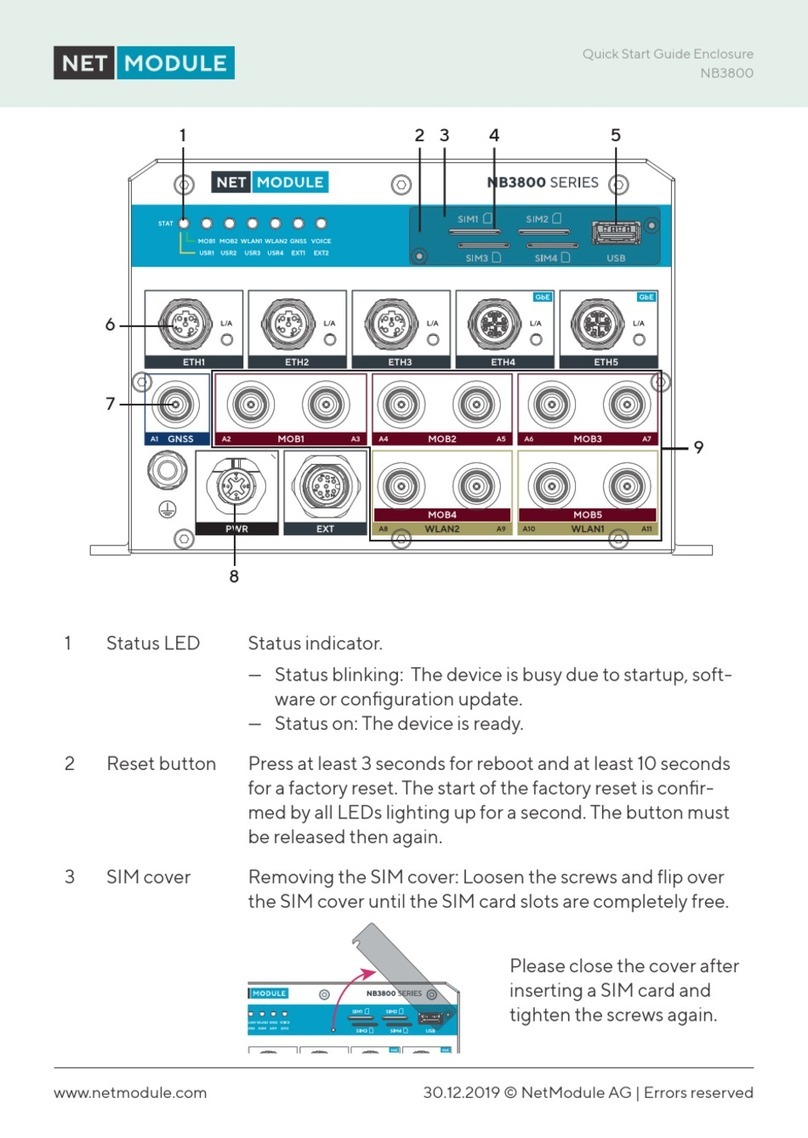
NetModule
NetModule NB3800 Series User manual
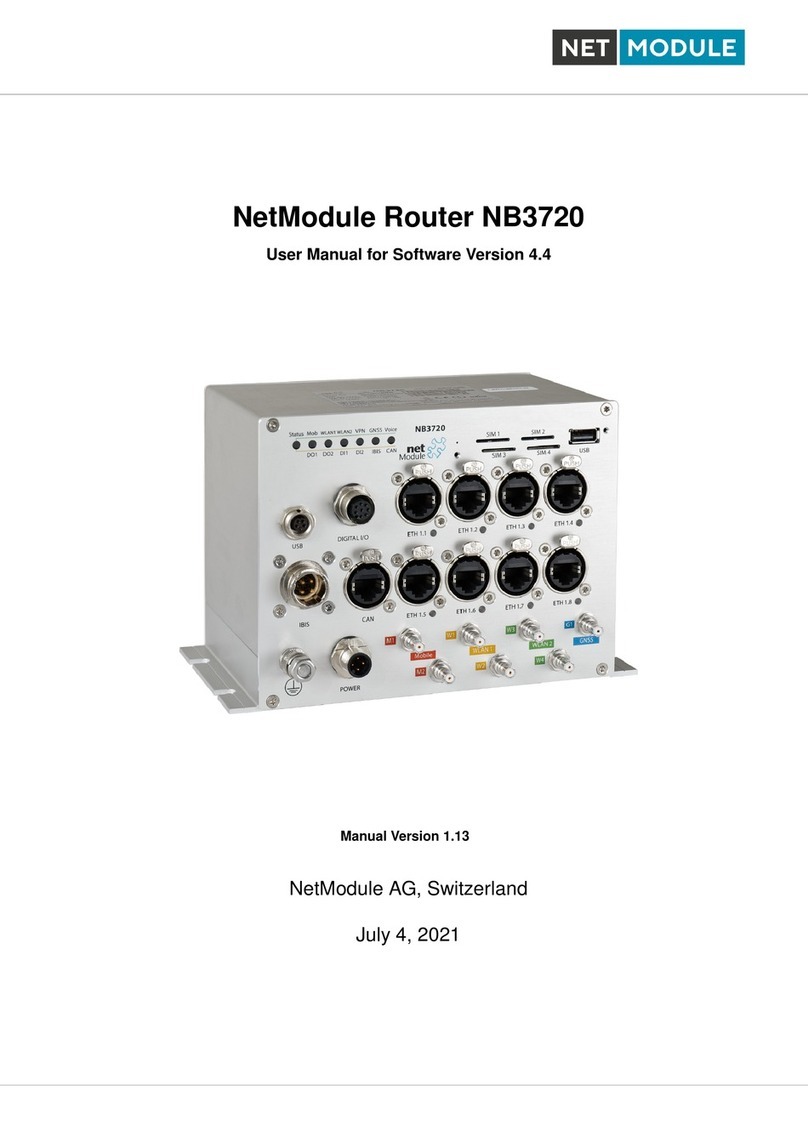
NetModule
NetModule NB3720 User manual
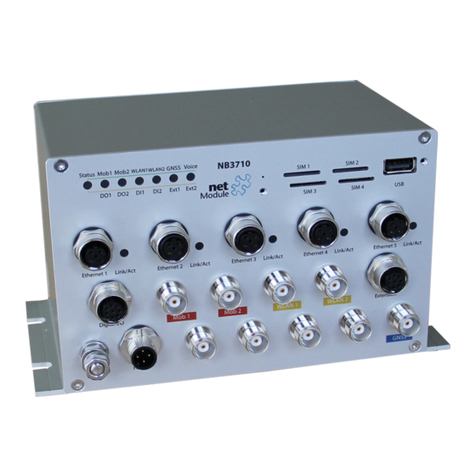
NetModule
NetModule NB3710-LWA User manual
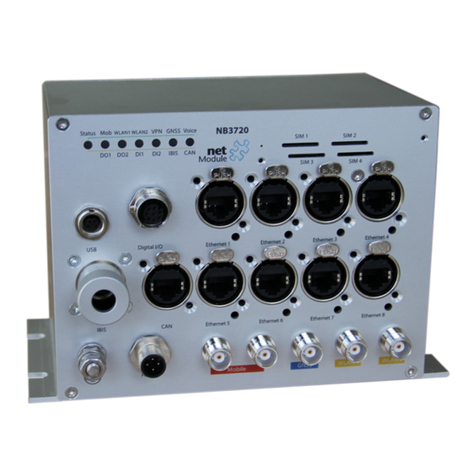
NetModule
NetModule NB3720 User manual
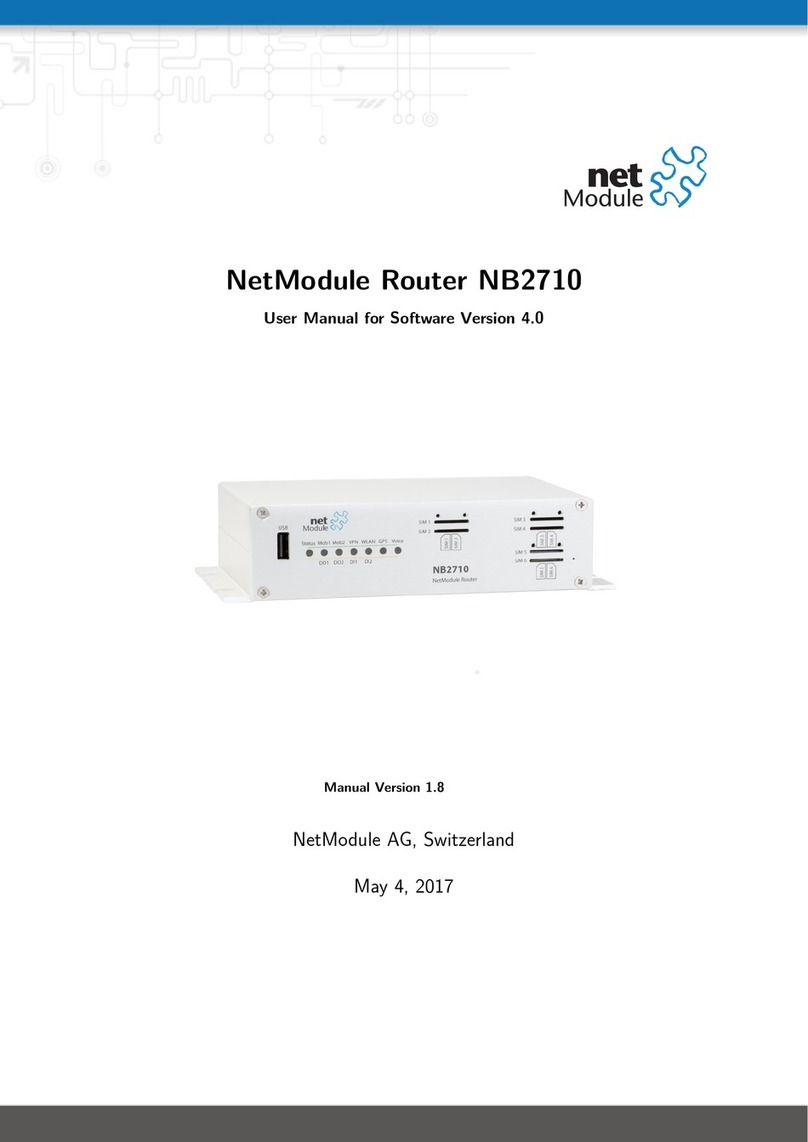
NetModule
NetModule NB2710 User manual
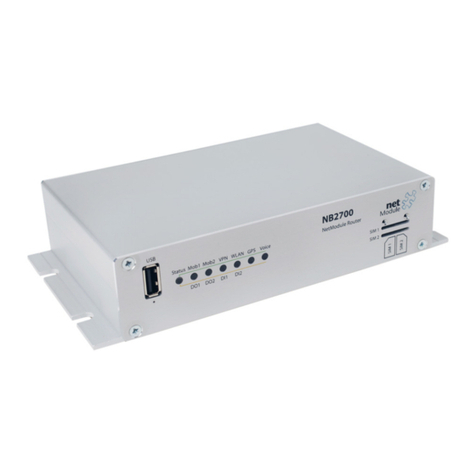
NetModule
NetModule NB2700 User manual
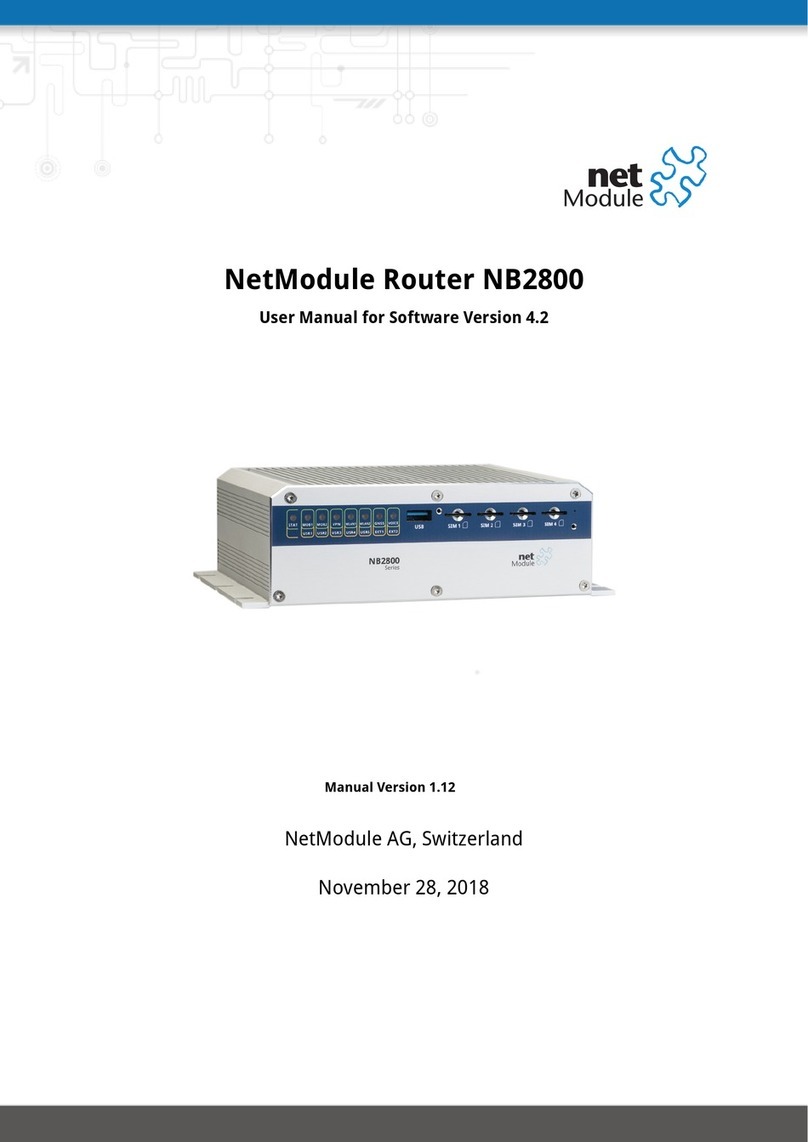
NetModule
NetModule NB2800 User manual
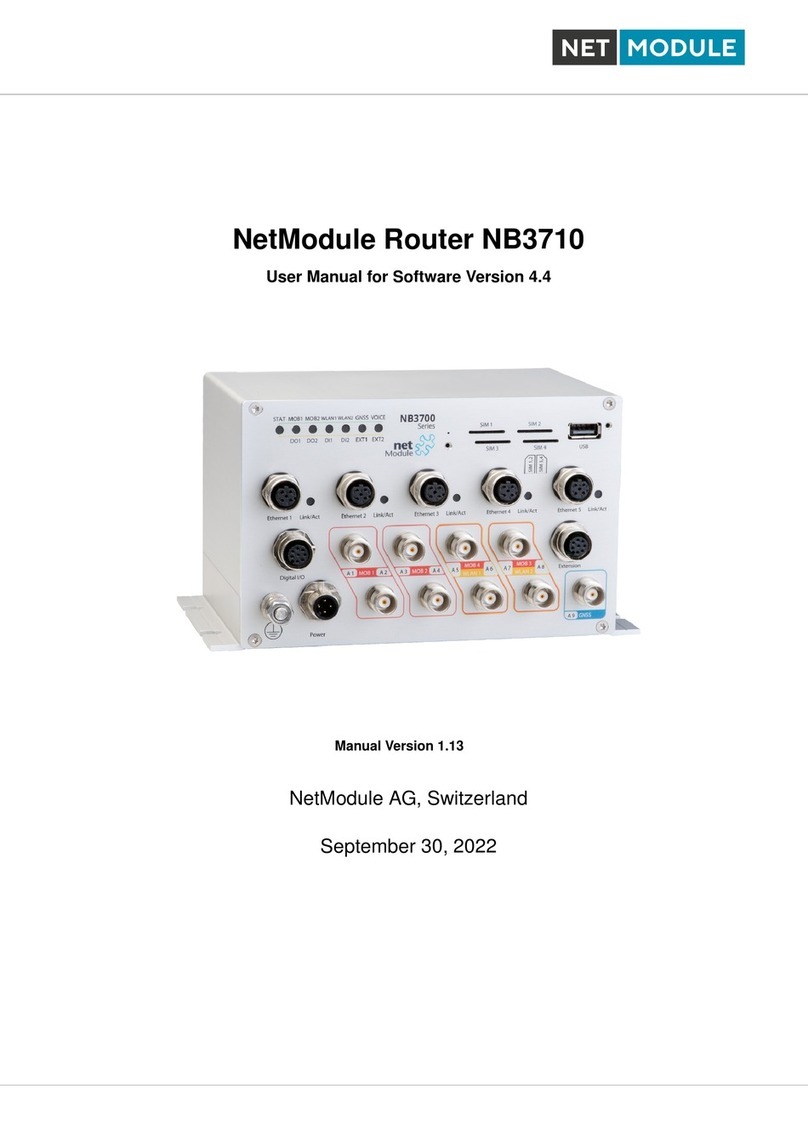
NetModule
NetModule NB3710 User manual
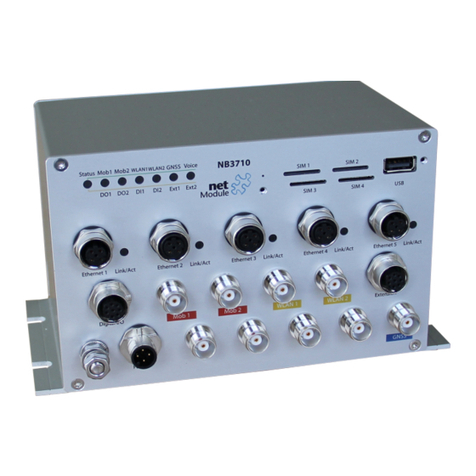
NetModule
NetModule NB3710 User manual
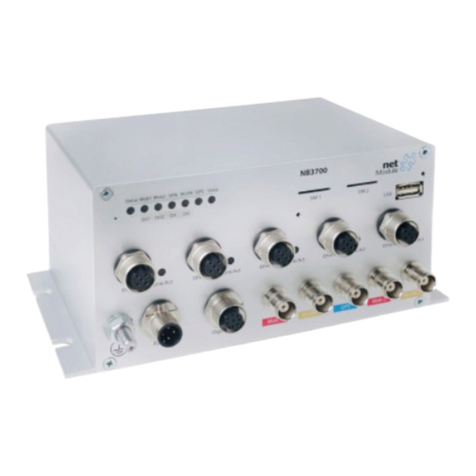
NetModule
NetModule NB3700 User manual

